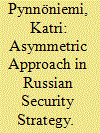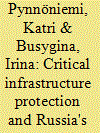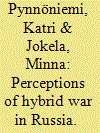| Srl | Item |
| 1 |
ID:
166656


|
|
|
|
|
| Summary/Abstract |
Two observations stand out from the Russian strategic outlook. First, it corresponds with the real politik vision of world politics where the states engage in (zero-sum) competition for power and resources. Second, the new world order emerges because of a conflict between different models of development and value systems. These two observations highlight a certain “family resemblance” between the current Russian assessment of the current security environment and the situation during the Cold War. Furthermore, Russian national security strategy is oriented toward achieving strategic stability with the other great powers. The maintenance of strategic parity (nuclear and conventional deterrence) is a means to this end. However, given Russia’s relative weakness in comparison to its major geopolitical competitors, this has led to the renewal of the Cold War-era concept of asymmetric approach. Although this concept is most often used in the context of nuclear deterrence and the debate on “strategic stability,” it is not about military security only. The set of asymmetric measures from economic dependence or sanctions, to diplomatic, political, and informational measures are used to prevent an emergence of a conflict that would threaten Russia’s sovereignty and domestic stability. The purpose of this paper is to explore the Soviet roots of Active Measures and how the Soviet heritage is present at both the theoretical level and in concrete practices. Finally, insights from the conceptual analysis are applied in assessing the vulnerability of the Nordic countries, in particular Finland and Sweden, to Russian influence operations.
|
|
|
|
|
|
|
|
|
|
|
|
|
|
|
|
| 2 |
ID:
125100


|
|
|
|
|
| Publication |
2013.
|
| Summary/Abstract |
The Russian policy on critical infrastructure protection was outlined in the early 2000s and has been consolidated in recent years as a part of the national security strategy. This policy is evolving against a background composed of an uneasy combination of factors: the degeneration of infrastructures critical for the country's economic and social development, and the de-legitimization of political institutions responsible for protecting 'population' and 'territory'. The recent major catastrophes in Russia, the notorious forest fires in 2010 in particular, have become examples of political events that offer a point of reference for the current regime's failure to uphold its promises of 'order and stability'.
|
|
|
|
|
|
|
|
|
|
|
|
|
|
|
|
| 3 |
ID:
179097


|
|
|
|
|
| Summary/Abstract |
In this article, we analyse what hybrid war entails in the context of Russian military periodicals. Two dominant interpretations emerge from the debate. Hybrid war involves a conflict between civilizations and a geopolitical struggle for power. In both cases, the West is represented as an active participant in the conflict, intent upon undermining Russia’s geopolitical status, cultural code and political system. The debate emulates Russian official rhetoric about national security threats and thus consolidates official interpretations, rather than offers alternatives to them. Russian analysts have also engaged in more abstract theoretical analysis in which hybrid terminology is rarely used or is approached critically. Further research is required to assess the ways in which this debate has been used in shaping public perceptions of threats towards Russia.
|
|
|
|
|
|
|
|
|
|
|
|
|
|
|
|
| 4 |
ID:
159548


|
|
|
|
|
| Summary/Abstract |
The conflict in Ukraine and the subsequent worsening of relations between Russia and the West has left a strong imprint on Russia’s strategic security documents. Starting with the renewal of military doctrine in late 2014, Russia has approved changes to all the major security documents within the pace of few years (2014–2016). This article analyzes how the key parameters of the national security strategy have evolved in comparison with the previous versions of the strategy. Revisions made to the text highlight Russia’s vision of world politics as struggle for resources and power, as well as a heightened sense of danger toward Russia. The analysis draws attention to the importance of an ‘asymmetric approach’ in Russia’s thinking on contemporary conflict situations.
|
|
|
|
|
|
|
|
|
|
|
|
|
|
|
|